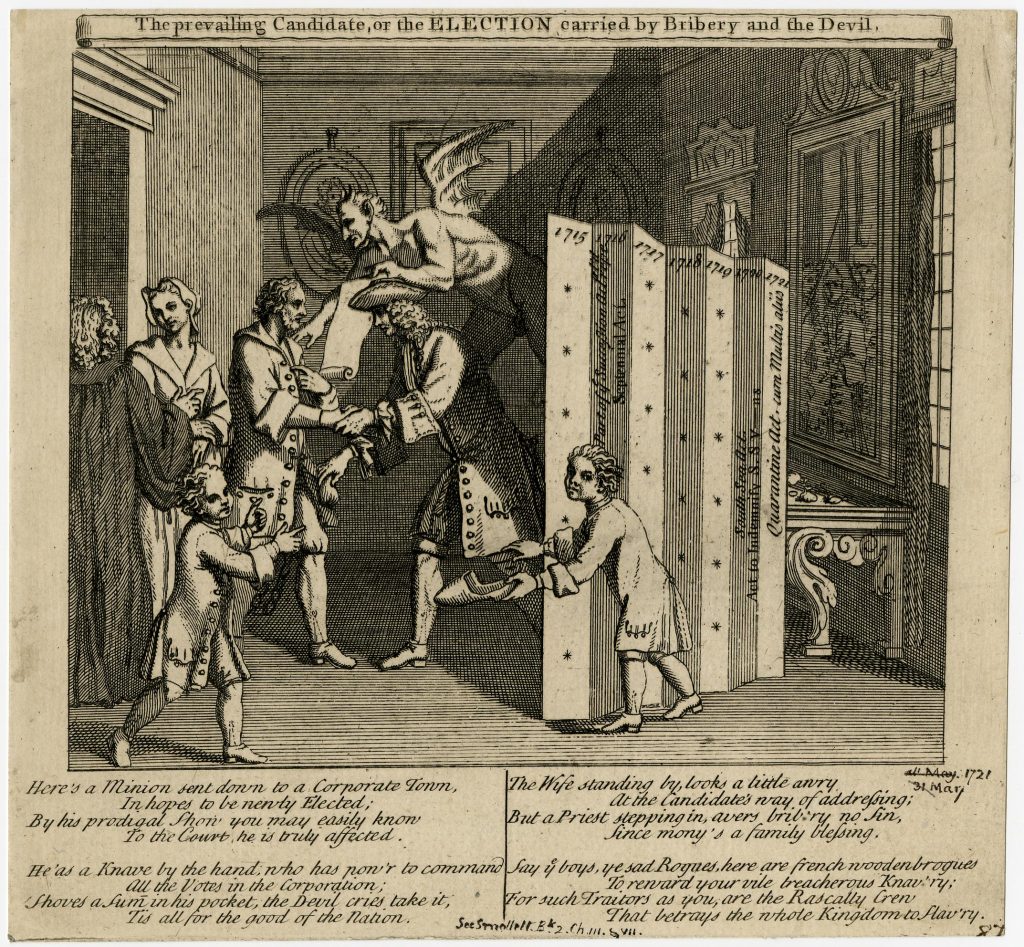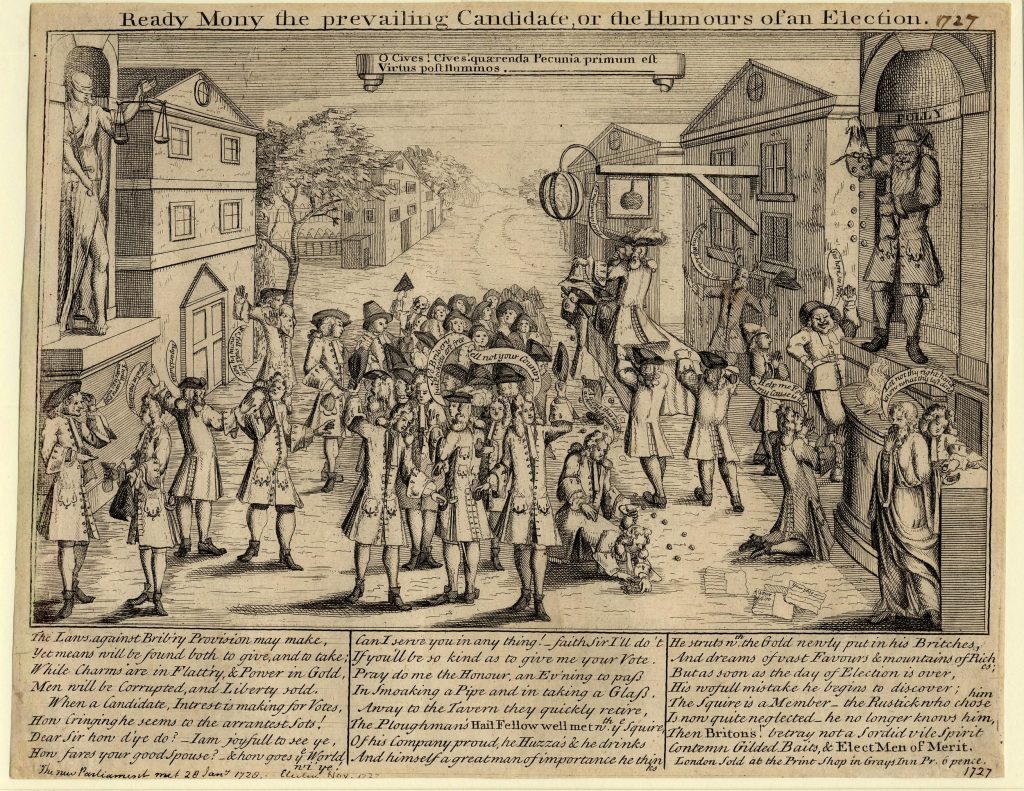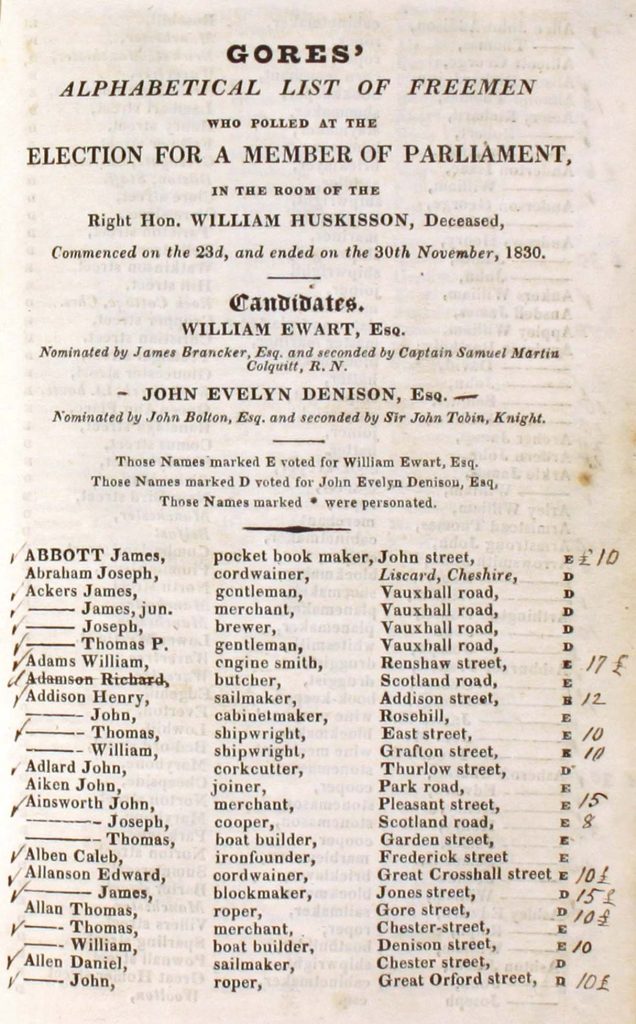Although technically illegal, bribery was rife in eighteenth-century elections. [15-minute read]
Technically, the Corrupt Practices Act of 1695 and the Bribery Act of 1729 made bribery illegal, but it remained endemic to the electoral process. Votes could often be bought, and, with no secret ballot, a candidate or his agents could check that individuals had voted as promised. In some cases, bribery was flagrant, with substantial sums of money changing hand. These bribes were distinct from the ‘treats’ typically offered to constituents in the years and months before an election. Eighteenth-century treats were part of conventional electoral practice and candidates who did not/would not offer this sort of a treat could be criticized for being miserly or even disrespectful of the voters.[1] Treating (and generously so) was viewed by voters as indicative of the candidate’s character and attentiveness to the interests and needs of his constituents. Treats frequently took the form of the provision of food and drink (as explored in the feature on election expenses), but treats could be used as a cover to provide outright bribes. For example, candidates covering the travel costs of outvoters to mitigate their loss of wages was conventional electoral practice. However, if the money paid to outvoters for their travel was inflated, that would have been considered a bribe. Candidates could also purchase goods from voters at inflated prices; and money could be passed to the wives and children of voters, all to avoid overtly giving money to the men who cast their votes, and so avoid violating the Acts.[2] Even treating people after the teste (or witnessing) of the writ of election was illegal and was considered bribery.[3]

One such scandalous case came to light at the small Wiltshire borough of Hindon in the 1770s. So little attempt was made to conceal the way that bribery was part of the fabric of elections there, and so significant an effect did it have on the result, that the corrupt practices were contested, exposed and brought to the attention of Parliament. Investigation revealed that householders had been provided with up to 20 guineas each over the course of the 1774 campaign. It was found that a ‘great number of voters’ and their families had attended The George public house in February 1773, specifically to receive their money.[4] William Penny testified that, ‘[Francis] Ward [Esq.] produced the Money; Five Guineas each was given – Notes of Hand were signed – he did not say for what it was given, nor Nobody in the Room’.[5] Five guineas in 1770 would be worth almost £500 in today’s money. With no questions asked or answered (and well in advance of the actual election), plausible deniability could be maintained in the years and months preceding the poll. Money could also be handed out under the pretext of a loan that would never be called in.[6] Elaine Chalus has uncovered that subterfuge was used in Hindon, as money, scrunched up tightly in a twist to look like tobacco, was distributed from a box.[7] William Crabb claimed that ‘they told us [it] was Tobacco for us. I put it in my Pocket; and when I came to examine it, I found it was Five Guineas’.[8] In Northampton, Lord Spencer’s agents distributed sandwiches with guineas concealed between the pieces of bread to people entering Althorp, as well as silver snuffboxes inscribed with the commemorative motto ‘Spencer, Howe and Liberty’, filled with guineas.[9] These tactics allowed for money to change hands with the understanding that the voters would vote for the briber’s candidates on polling day.
During polling, oaths attesting to land ownership and bribery could be administered.[10] This was not always done, but candidates could require them to be sworn if they thought bribery or improper property ownership was being claimed. The Bribery Oath read:
I, A.B. do swear, that I have not received of had by myself, or any person whatsoever, in trust for me, or for my use or benefit, directly or indirectly, any sum or sums of money, office, place, or employment, gift, or reward, or any promise or security, for any money, office, employment, or gift, in order to give my vote at this election; and that I have not been before polled at this election. So help me God.[11]
The Bribery Oath emphasises that bribes could take many forms, from cash to positions of status or employment within the community, or even promises of these rewards. The administration of the oath was used by opponents to challenge the validity of voters. However, this was a risky move if the opposing candidates had also engaged in bribery, as turned out to be the case in the Middlesex election of 1802. Some candidates even agreed in advance of the campaign that they would not encourage the administration of the bribery oath.[12] According to Frank O’Gorman, the bribery oath was only administered three times in Liverpool between 1796 and 1830.[13]

For Liverpool in 1830, a by-election was required after one of Liverpool’s sitting members, William Huskisson, died at the opening of the Liverpool-Manchester Railway. After much political manoeuvring, two candidates emerged who were old schoolmates and political allies: William Ewart and John Evelyn Denison. Ewart was elected following a scrutiny by a narrow margin. The election was notable for its eyewatering cost of £100,000 and widespread bribery. A copy of the poll book held at the British Library contains annotations detailing more than £22,000 worth of bribes. A different copy, held in the Liverpool Archives, similarly shows thousands of voters receiving payments of between £5 and £40. The scale of corruption was so severe that Liverpool was compared to some of the most notoriously venal boroughs in England (such as East Retford and Evesham), and some feared it would be disenfranchised. A petition was submitted by a group of merchants alleging bribery against Ewart, of which a select committee found him guilty, declaring the election void. However, no new writ was issued before the dissolution of parliament. Despite the 1830 Liverpool election being declared void, bribery in the city was rampant once again in 1832, with around 1300 freemen receiving bribes ranging from £10 to £60. The extent of financial corruption prompted the House of Commons to pass a Bill disenfranchising Liverpool in March 1834, although the Bill did not pass the House of Lords.[14]

Grampound was a notoriously corrupt rotten borough. It was described in 1808 as a borough with ‘very extensive privileges’, making the buying and selling of votes an easy task for candidates and local families.[15] In 1815, Sir Christopher Hawkins sold his interest in Grampound to Sir Manasseh Massah Lopes, first baronet of Maristow House near Plymouth. During the 1818 general election, Lopes sent his agent to Grampound where he bribed 40 voters at £35 each (£1400 total), a lower price tag than that paid by Hawkins at £50 per person. During the election, numerous candidates stood to represent the borough, including John Innes (Tory); Alexander Robertson (Tory); John Teed (Independent); Ebenezer John Collett (Tory); Benjamin Shaw (Tory); and William Allen (Independent). During the polling, John Teed repeatedly called for the bribery oath to deter Lopes’ bribed electors from voting. Allen also called for the bribery oath, but ‘appearing to be not quite sober, it was objected that being intoxicated he could not be a candidate’. After a chaotic day of polling, the mayor adjourned, and polling resumed the following day. During a scrutiny, it was found that 33 of 36 voters who supported Innes and Robertson had been bribed by Lopes. Innes and Robinson were elected for Grampound, though the result was challenged by Teed. In order to quash his petition, the newly elected MPs offered him £7,800, a bribe which was rejected. Teed was later the chief witness in the prosecution of Sir Manasseh Massah Lopes in 1819, which found Lopes and 23 other electors guilty of bribery. Despite this, the House of Commons rejected the petition; however, Grampound’s history of bribery and corruption was such that Lord John Russell included the borough in his 1819 resolutions for borough reform. Grampound was eventually disfranchised on 30 May 1821, the only constituency to be entirely disenfranchised before the Reform Act of 1832.
Over the course of the nineteenth century, politicians sought to crack down further on bribery and corruption. Bribery and treating were debated in 1840, ultimately affirming that voters who lost a day of work to vote ought to be compensated with food and drink. In 1854, the Corrupt Practices Prevention Act was passed, more clearly outlining practices of bribery, before the 1883 Corrupt and Illegal Practices Act criminalised bribery attempts with fines and imprisonment as punishments. The 1883 act encoded that candidates charged with corruption could not stand for election for seven years or for the same borough. A century later, in 1983, section 114 of the Representation of the People Act legislated that any election agent, candidate, or voter offering or accepting food, drink, money, or entertainment could be found guilty of treating and prosecuted.
[1] Elaine Chalus, Elite Women in English Political Life c.1754-1790 (Oxford, 2005), 210.
[2] Frank O’Gorman, Voters, Patrons, and Parties: the unreformed electoral system of Hanoverian England 1734-1832 (Oxford, 1989), 160-3.
[3] Elaine Chalus, ‘Gender, Place and Power: Controverted Elections in Late Georgian England’, in Gender and Political Culture in Early Modern Europe, 1400-1800, ed. by J. Daybell, & S. Norrhem (Routledge, 2017), 179-202.
[4] Report from the Select Committee … for the Borough of Hindon (London, 1775), 20.
[5] Report from the Select Committee, 20.
[6] Report from the Select Committee, 40.
[7] Chalus, ‘Gender, Place and Power’, 179-202.
[8] Report from the Select Committee, 31, 48.
[9] Zoe Dyndor, ‘The Political Culture of Elections in Northampton, 1768-1868’ (PhD thesis, University of Northampton, 2010), 184.
[10] 2 Geo. II. c. 24.
[11] The squib-book; an impartial account of the Liverpool election, March, 1820 (Liverpool, 1820), 27.
[12] O’Gorman, 134.
[13] O’Gorman, 134.
[14] O.F. Christie, The Transition from Aristocracy, 1832-1867 (London, 1928), 129.
[15] Benjamin Capper, A Topographical Dictionary of the United Kingdom (London, 1808).


